Uganda. “Giving our lives to the people of Karamoja”.
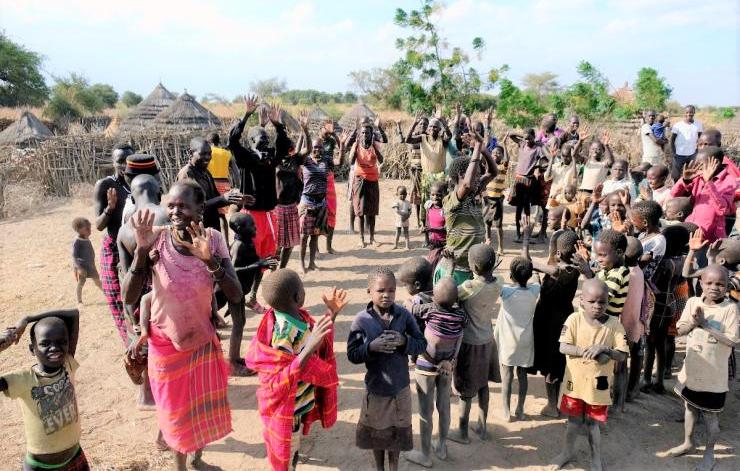
For over a hundred years, the Comboni Missionaries have been working in north-eastern Uganda. “Being a missionary here means living side by side with the people, knowing their language and culture, and, if necessary, giving one’s life for them”. This is what Father Longinos López Fernández, from Spain, and Father Germano Joaquim dos Santos Serra, from Portugal, both working in Karamoja, said. We met them in Karamoja.
Located in north-eastern Uganda, the Karamoja region is one of the poorest in the country. It is a region traditionally inhabited by groups of pastoralists – called Karimojong – who frequently stray into neighbouring Kenya, giving rise to nomadism that easily becomes a source of tension and violence.The region is also the site of important pastoral work since the Christian faith arrived there, thanks to the courage and daring of the Comboni missionaries, whose work continues to this day. The faith is also ensured and strengthened, thanks to the presence of local catechists who guarantee its transmission, always combining it with local tradition and culture.
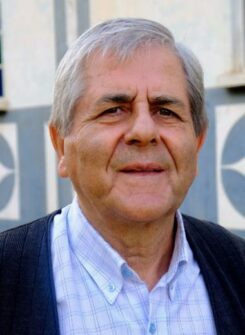
Elanyangikoi is the name by which Father Longinos López Fernández is known among the Karimojong.
Elanyangikoi is the name by which Father Longinos López Fernández is known among the Karimojong. When he was still a deacon, he was sent to Karamoja for pastoral work experience. One day, he was on his way in a pick-up truck to visit a village. The car was overloaded with people.
All of a sudden, the vehicle found itself in the middle of a raid by a group of warriors from a neighbouring ethnic group, who had come to steal cattle. Longinos still remembers that terrible event: “The only thing I thought to do was to step on the accelerator as much as I could and get as far away as possible from that hell, following the direction taken by the fleeing people. He had never heard gunshots in his life except on television and in the cinema. In the attack one person was killed.
The other passengers and locals commented on Longinos’ behaviour like this: “Apa elanyani ngikoi” [“father outran (in speed) the bullets”]. Since then, Longinos has been Elanyangikoi to everyone. In Karamoja, the work of the missionaries is carried out in harmony with that of the local clergy. The Church’s presence is characterised by a real closeness to the people, made up of direct contact with the persons who live in traditional villages, where ancestral traditions and ancient ways of life still persist.
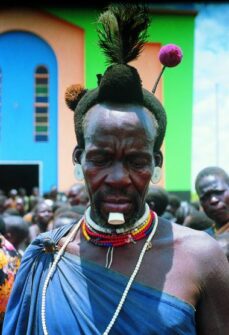
Karimojong elder. The Church’s presence is characterized by a real closeness to the people.
Father Longinos says: “We Comboni missionaries are called to evangelise by giving our lives to these people, without expecting anything in return. On the other hand, a missionary who is not prepared to live like the people of the place where he is sent, literally getting his hands dirty and working hard to build something tangible as well, is most likely not a ‘good missionary’, because he will always be perceived by the people as someone who is out of touch with their surroundings. Life in the villages is very different from what one finds in the city. Those who come here to help must adapt to the way of life of the locals. Whether you are a white man or an African, it matters little: you have to fit completely into the environment and grow with those who live there.”
To be a missionary in Karamoja, it is indispensable to possess the local language. The study and preservation of this ancient language owe much to two Comboni missionaries, authentic pioneers in this field: Father Bruno Novelli and Father Mario Mantovani, both of whom have been in heaven for years. Today, this important work is carried on by a Portuguese Comboni missionary, Father Germano Serra.
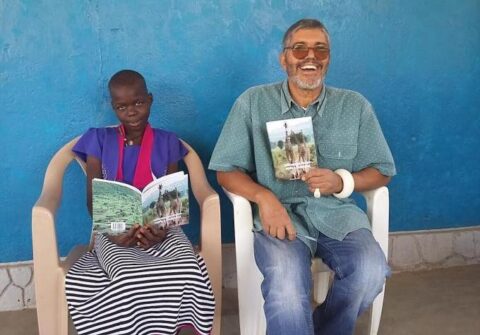
Father Germano Serra. Since his arrival in 1984, he has never stopped studying both the culture and the Karimojong language.
He arrived in Uganda in 1984 and immediately became part of the local culture, well received by the local population. Since his arrival, he has never stopped studying both the culture and the Karimojong language, also trying to preserve and spread it, preventing its disappearance. It can be said without a shadow of a doubt that this has always been one of his missionary goals. And it continues to be so.
Father Germano is proud of his passion for the Karimojong language, which he intends to safeguard at all costs. To this end, he has even opened websites and blogs where only this language is allowed, and people take part in them, competing to see who can show off the best Karimojong. A Karimojong dictionary and grammar are now accessible on the Internet, and it is possible to enrich and deepen them. Father Germano is happy here. He says he would not mind ending his days in Karamoja.We had the opportunity to visit a village in Losilang parish, pastorally cared for by Joseph Lokedin, a diocesan priest. We were greeted festively by the people, who took to dancing in their typical way: the dancers perform prodigious ‘high jumps’.
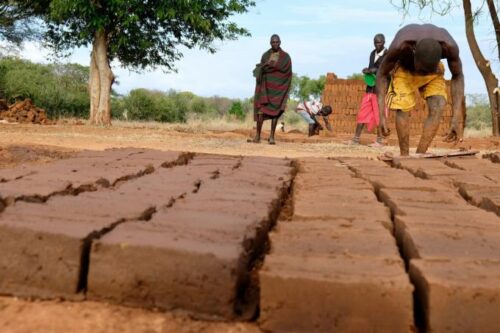
They build bricks following the traditional method.
The people of the village are very generous towards their pastor. The parish community has also started an income-generating project: they build bricks following the traditional method, handed down by the elders. Although we are in the 21st century, these bricks work wonderfully here and are in great demand.
The courageous commitment shown by the Comboni missionaries working in this region undoubtedly owes its origin to their specific vocation: to give their lives to Africa. But their commitment is also nourished by the example of those who have paid for this evangelising work with their blood.
We went to see the tomb of Father Mario Mantovani, also visited by many visitors today. Father Mario was one of the pillars of the evangelisation work in Karamoja. He was one of the first to specialise in the study of the local language, writing two grammars and a specific study on the verb, and compiling a voluminous vocabulary. Even today, all those who want to work here make use of these three volumes.
One day, Father Mario was travelling with Kiryowa Godfrey, a young Ugandan Comboni brother. Their car was attacked by a large group of raiders (over 300) and the two were riddled with bullets. Before them, 11 other Comboni missionaries had shed blood in Uganda, victims of the violence that here often takes the form of robbery or raid.
In this place whose culture is more than unique and where few foreigners can boast of actually owning the language, Comboni missionaries and sisters are working today. They have come here to give their lives to these wonderful people. (Ecclesia)



